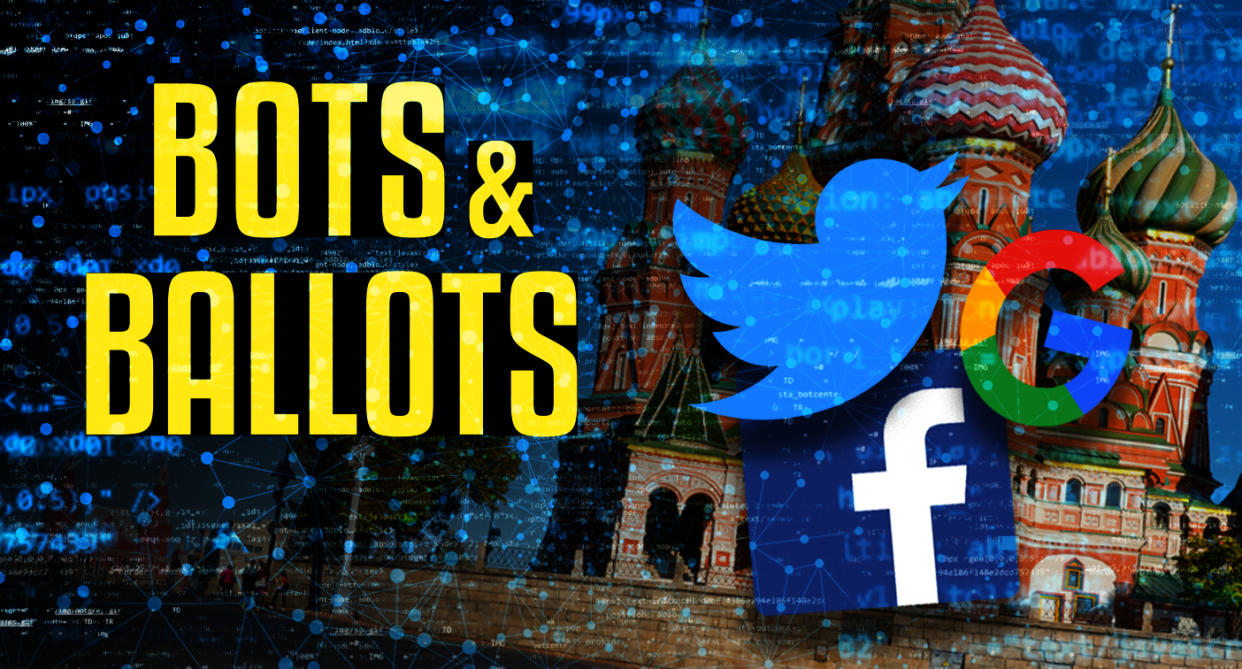Former Twitter executive: Trump is in denial over social media threat to midterms

SAN FRANCISCO — President Trump often complains about “fake news,” but with the 2018 midterm elections fast approaching, his administration has done little to try to combat those who would use it to subvert American democracy.
“I think that the biggest problem with 2018 is the fact that the administration still won’t really acknowledge that there is a problem,” Adam Sharp, Twitter’s former head of news, government and elections told Grant Burningham, host of the new Yahoo News podcast “Bots & Ballots.”
“To the extent that there is any effort to make sure that our systems and public debate around the election are not manipulated by foreign powers,” he continued, “that effort is being led entirely by the private sector, by Twitter and Facebook and Google, each working independently to try to do the right thing, but in their own ways, on their own, with their own duties to their shareholders.”
Sharp, who left Twitter just before the 2016 presidential election, says Americans using social media remain vulnerable to foreign election interference and blames the federal government.
“You would not have left the response to 9/11 to the real estate holders of lower Manhattan. When the country gets attacked, there’s a responsibility for the government to act, and that’s where I think the White House’s refusal to engage on the topic has been particularly problematic.”
Sharp isn’t exactly holding his breath for Trump to jump into action to safeguard the midterm elections, nor is he confident that companies like his former employer will do enough to combat the threat. That’s partly because American laws don’t oblige social media platforms to combat the spread of disinformation by users.
Download or subscribe on iTunes: “Bots & Ballots” by Yahoo News
“In a legal sense, and let me first say the legal technicality sense, there is no obligation,” Sharp said. “These companies thrived in large part due to one section of one law, section 230 of the Communications Decency Act as amended in 1996, that gives extremely broad immunity to these platforms against any responsibility for content on the platform.”
Having witnessed firsthand the consequences of the legalize that allowed “fake news” to flourish in 2018, Sharp believes tech companies themselves have come to the conclusion that it is in their best interest to try to combat its proliferation.
“From a more moral and practical sense, I think the platforms have a responsibility to step up, especially when things are gaining speed and are demonstratively false and leading to violence, and so on,” Sharp said.
“The challenge is identifying where you draw the line,” he added. “Because very often it ends up being a question of interpretation and do you really want these private companies, who as private companies have the ultimate duty to their shareholders, to essentially become the moral arbiters of what is appropriate speech or not in the public space. I think the government and the elected representatives of the people should be the ones laying out what those guardrails should be and what those parameters should be for what is considered appropriate in the public square.”
_____
About “Bots & Ballots”: In the digital era, information and the social media platforms used to spread it have become weapons of choice for those seeking to short–circuit American democracy. Yahoo News’ new weekly podcast explores the intersection of politics and technology, as told by those in Washington, D.C., and Silicon Valley trying to prevent a repeat of the infiltration of the 2016 presidential election.
_____
Read more from Yahoo News:
Stephen Miller, meet your great-grandfather, who flunked his naturalization test
From the ‘Northern Triangle’ to the Rio Grande: Violence, poverty and disasters drive migration
The dominance game, as played by dictators and other animals
With DACA phasing out, college graduates face an uncertain future
Photos: Patrolling the border, where immigrants wait to be caught


